När det är dags att flytta din WordPress-webbplats till en ny domän, är din första tanke troligen din SEO. Du vill se till att all trafik och auktoritet du har byggt upp följer med dig.
Vi förstår det helt. Vår guide är byggd kring ett centralt mål: en smidig flytt som fullständigt skyddar dina sökrankningar genom att följa en exakt metod.
Denna metod involverar en serie steg som utförs i rätt ordning, vilket inte lämnar något åt slumpen. Den guidar sökmotorer genom förändringen, och vi finns här för att göra denna övergång till en enkel framgång för dig.
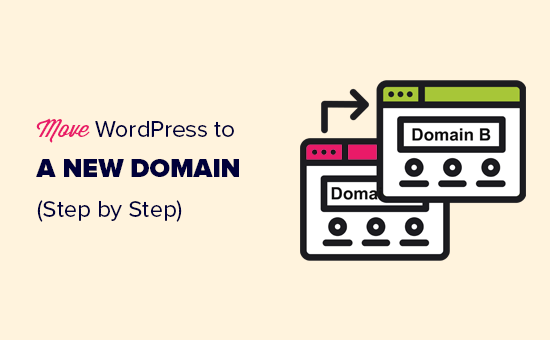
Att migrera din WordPress-webbplats till ett nytt domännamn kan vara skrämmande, men det behöver det inte vara. Vi är här för att guida dig genom varje steg i processen.
Du kan klicka på någon av länkarna nedan för att gå till ett visst steg i migreringen av din WordPress-webbplats till ett nytt domännamn:
- Vad du bör veta innan du byter domän
- Förberedande steg: Vad du behöver för att komma igång
- Steg 1: Skapa ett Duplicator-paket av din WordPress-webbplats
- Steg 2: Skapa en databas för ditt nya domännamn
- Steg 3: Packa upp WordPress på ditt nya domännamn
- Steg 4: Ställ in permanenta 301-omdirigeringar
- Steg 5: Meddela Google om din nya domän
- Meddela dina användare om det nya domännamnet
- Vanliga frågor om att flytta en WordPress-webbplats
- Video Tutorial
Vad du bör veta innan du byter domän
Innan du börjar finns det några saker du bör känna till.
Processen att överföra till en ny domän kommer att *tillfälligt* påverka dina sökmotorrankningar eftersom Google och andra sökmotorer kommer att behöva anpassa sig till ändringarna.
Det kommer också att påverka din sökningstrafik tillfälligt. Tänk på att detta är normalt och händer alla webbplatser som byter till en ny domän.
Du kan dock dramatiskt minska SEO-påverkan genom att följa den här guiden. Vi kommer att visa dig det rätta sättet att flytta din WordPress-webbplats till ett nytt domännamn, ställa in korrekta 301-omdirigeringar och meddela sökmotorer.
Vänligen notera att den här guiden inte är för att flytta en WordPress-webbplats till en ny värd. Denna är endast för att byta domännamn. Även om processen är liknande, finns det några extra steg. Dessa extra steg hjälper dig att skydda dina SEO-rankningar och trafik.
Slutligen, om din gamla webbplats finns på WordPress.com, då behöver du följa instruktionerna i vår guide om hur du flyttar från WordPress.com till WordPress.org istället.
Förberedande steg: Vad du behöver för att komma igång
I den här guiden antar vi att du har din WordPress-webbplats inställd på oldsite.com, och du försöker migrera den till newsite.com.
Vi antar också att du redan har ett WordPress-värdkonto och att du är bekant med din webbvärds kontrollpanel.
Du behöver också veta hur man använder en FTP-klient som FileZilla eller hur man redigerar filer med hjälp av filhanteraren som finns tillgänglig i din webbhotells instrumentpanel.
Om du inte har en webbhotellleverantör eller letar efter att byta till en ny, rekommenderar vi att du använder Bluehost (bra för små webbplatser + kommer med en gratis domän) och antingen SiteGround eller WP Engine (bra för större webbplatser eller webbutiker).
När du har dessa saker på plats är du redo att påbörja processen!
Steg 1: Skapa ett Duplicator-paket av din WordPress-webbplats
Det första du behöver göra är att skapa en fullständig säkerhetskopia av din WordPress-webbplats.
Du kommer sedan att använda denna säkerhetskopia för att skapa en kopia av din webbplats så att du kan ställa in omdirigeringarna korrekt från din gamla domän till den nya.
Medan det finns många WordPress backup-plugins tillgängliga, kommer vi att använda Duplicator för den här handledningen.
Duplicator är det bästa pluginet för säkerhetskopiering och migrering av WordPress. Vi har använt det för att migrera otaliga webbplatser för våra egna företag såväl som för kunder. Vi har funnit att det fungerar tillförlitligt, även för mycket stora webbplatser.
Notera: Det finns också en gratis version av Duplicator tillgänglig, som du kan använda för denna migrering. Vi rekommenderar dock att uppgradera till en betald plan för att låsa upp fler funktioner som automatiska molnsäkerhetskopior, återställning av webbplats med ett klick, enklare migreringar och mer.
Låt oss börja med att installera och aktivera Duplicator-pluginet på ditt gamla domännamn. För mer information, se vår steg-för-steg-guide om hur man installerar ett WordPress-plugin.
När pluginet har aktiverats lägger det till ett Duplicator-menyalternativ i din WordPress-admin. Du behöver gå till sidan Duplicator » Backups och sedan klicka på knappen ‘Create New’ för att skapa en ny säkerhetskopia eller kopia av din WordPress-webbplats.
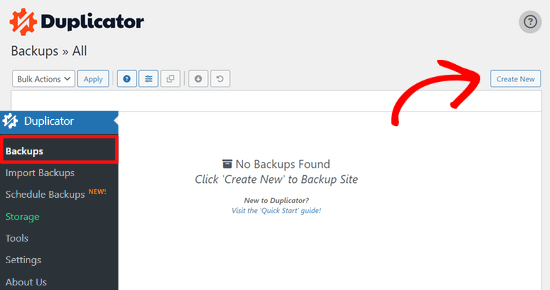
Duplicator kommer nu att initiera guiden för säkerhetskopiering, den kommer automatiskt att tilldela ett namn till detta paket.
Klicka på knappen 'Nästa' för att fortsätta.
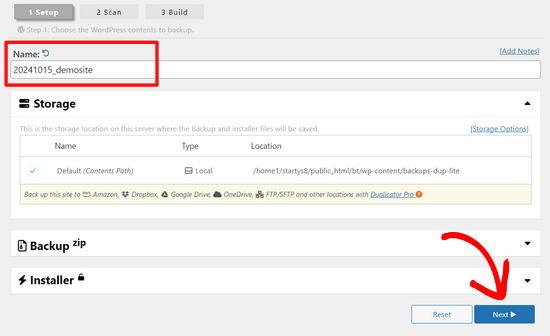
Duplicator kommer nu att köra några tester för att se om allt är i sin ordning. Om pluginet hittar ett problem, kommer du att se en varning med instruktioner.
Om alla objekt är markerade som 'Bra', klicka sedan på knappen 'Bygg'.
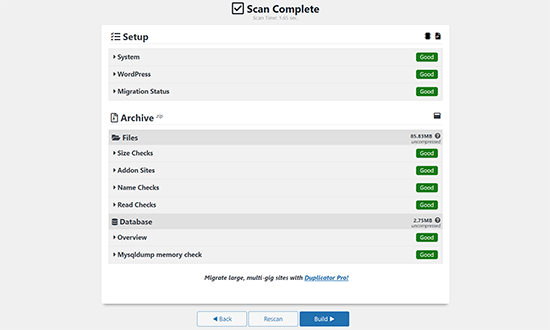
Pluginet kommer nu att börja skapa ett dupliceringspaket av dina webbplatsfiler. Beroende på storleken på din webbplats kan denna process ta några minuter.
När du är klar ser du ett alternativ för 'Ladda ner'. Om du klickar på det visas alternativ för att ladda ner båda filerna eller ladda ner installationsprogram och arkiv (zip) separat.
Välj 'Ladda ner båda filerna' för att ladda ner dem till din dator.
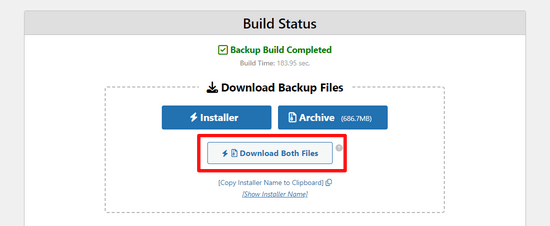
Arkivfilen är en komplett kopia av dina WordPress-filer. Den inkluderar dina WordPress-teman, inställningar för permalänkar, plugins, uppladdningar och alla andra filer som skapats av WordPress-plugins.
The installer script is a PHP file that will automate and run the WordPress migration by unpacking the archive file.
Steg 2: Skapa en databas för ditt nya domännamn
Innan du flyttar din WordPress-webbplats till den nya domänen behöver du en ny SQL-databas för att packa upp WordPress på ditt nya domännamn.
Om du redan har skapat en databas kan du hoppa över det här steget.
För att skapa en databas måste du besöka din värdkontos cPanel-instrumentpanel, rulla ner till avsnittet 'Databaser' och sedan klicka på ikonen 'MySQL Databases'.
Vi visar dig hur du hittar den på Bluehost, men de grundläggande instruktionerna är desamma och bör gälla för alla hosting-leverantörer.
Logga in på ditt Bluehost-kontos instrumentpanel och klicka på knappen ‘Inställningar’ under din webbplats.
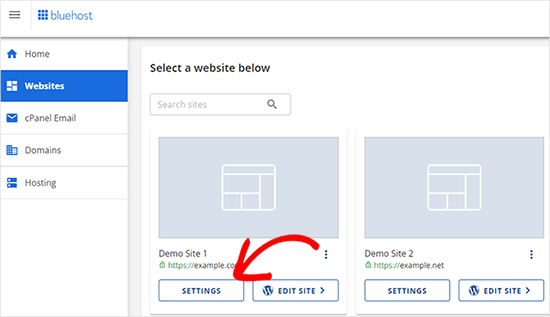
Under dina webbplatsinställningar måste du växla till fliken 'Avancerat'.
Skrolla ner lite till cPanel-sektionen och klicka på 'Hantera'.
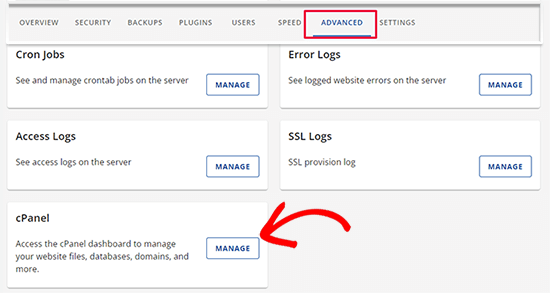
Detta öppnar cPanel-instrumentpanelen.
Bläddra ner till avsnittet Databaser och klicka på alternativet 'MySQL-databaser'.
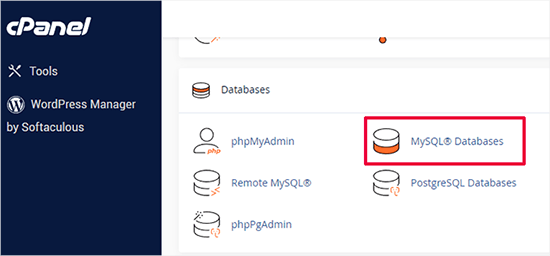
Notera: Ditt kontrollpanel för hosting kan se något annorlunda ut än skärmbilderna. Du bör dock fortfarande kunna hitta en sektion för databaser med ett alternativ för att skapa en ny databas.
Ange bara ett namn för din databas och klicka sedan på knappen 'Skapa databas'.
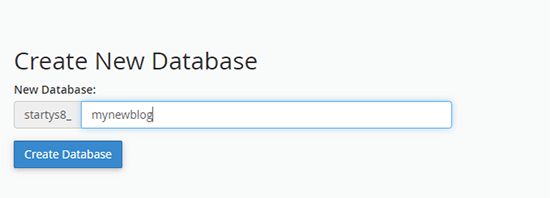
cPanel kommer nu att skapa en ny databas åt dig. Därefter behöver du skrolla ner till avsnittet MySQL-användare.
Ange sedan ett användarnamn och lösenord för din nya användare och klicka på knappen 'Skapa användare'. Se till att notera användarnamnet och lösenordet på en säker plats.
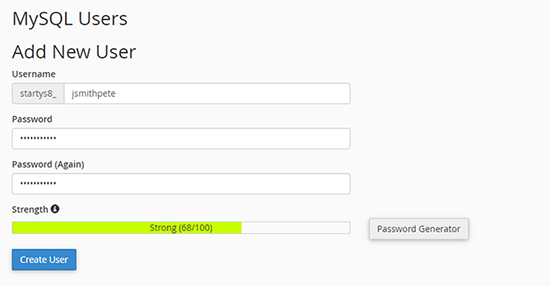
Den nya användaren du precis skapade har fortfarande inte behörighet att arbeta med databasen. Låt oss ändra på det.
Bläddra ner till avsnittet 'Lägg till användare i databasen'. Välj först databasanvändaren du skapade från rullgardinsmenyn bredvid fältet 'Användare'. Välj sedan den nya databasen du just skapade och klicka på knappen 'Lägg till'.
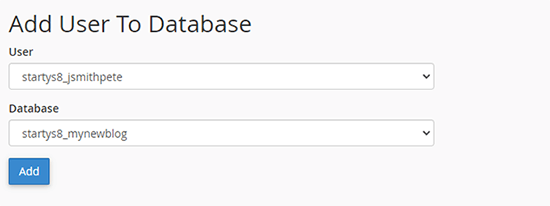
Därefter kommer du att bli ombedd att välja behörigheter för användaren.
Välj 'Alla privilegier' och klicka på knappen 'Gör ändringar' för att fortsätta.
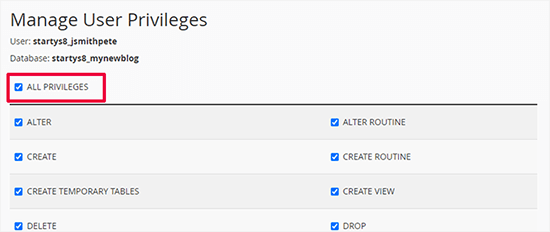
Din databas är nu redo och kan användas för att flytta WordPress till det nya domännamnet.
Se till att anteckna databasnamnet, användarnamnet och lösenordet. Du behöver denna information i nästa steg.
Steg 3: Packa upp WordPress på ditt nya domännamn
Nu behöver du ladda upp Duplicator-filerna som du laddade ner tidigare till ditt nya domännamn.
Duplicator-paketet inkluderar även din WordPress-installation. Det betyder att du inte behöver installera WordPress på din nya domän.
Anslut först till ditt domännamn med en FTP-klient. När du är ansluten, se till att webbplatsens rotkatalog är helt tom.
After that, you can upload the archive and installer files to the root directory. This is usually called public_html.
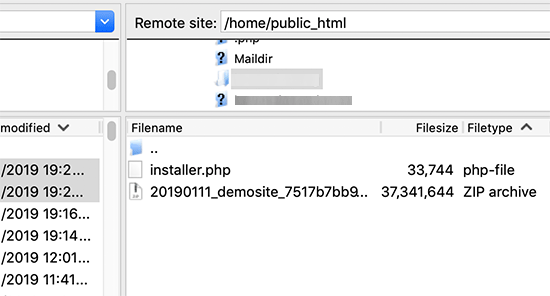
När båda filerna har laddats upp är du nu redo att packa upp WordPress.
Öppna en ny flik i webbläsaren och gå till följande URL:
http://example.com/installer.php
Glöm inte att ersätta example.com med ditt nya domännamn. Detta startar Duplicator-migreringsguiden.
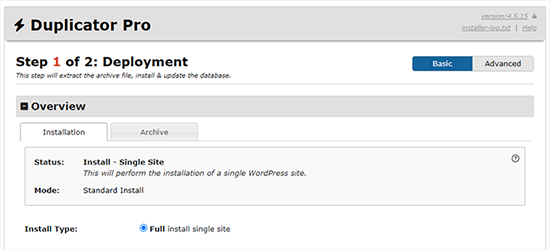
Installationsprogrammet kommer att leta efter arkivfilen och sedan automatiskt välja alternativ åt dig på skärmen.
Skrolla ner lite för att ange informationen för databasen du skapade i föregående steg.
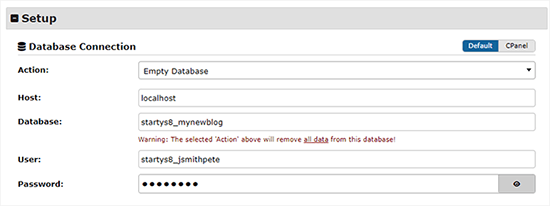
Nedanför kommer Duplicator automatiskt att visa dig URL:en för din gamla domän och din nya domän.
Om allt ser bra ut, klicka på knappen 'Validera' för att fortsätta.
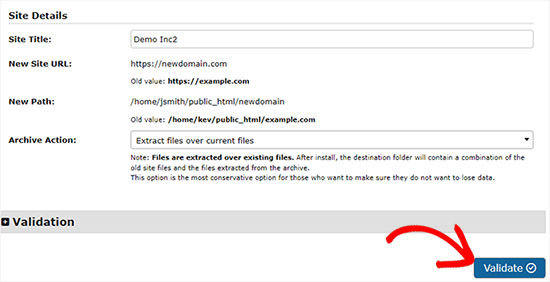
Duplicator kommer nu att försöka ansluta till databasen med den information du angett.
Vid lyckat resultat visas ett valideringsgodkännande. Annars visas en varning med detaljer om hur du åtgärdar det.
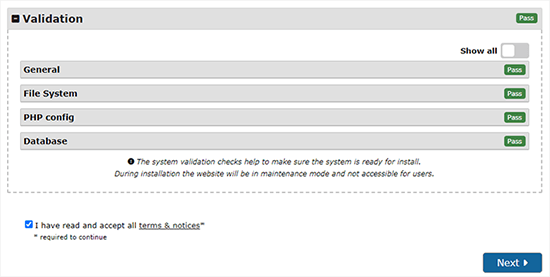
Klicka på knappen 'Nästa' för att fortsätta.
Duplicator kommer nu att börja importera din WordPress-webbplats. När det är klart ser du ett framgångsmeddelande med en knapp för Admininloggning.
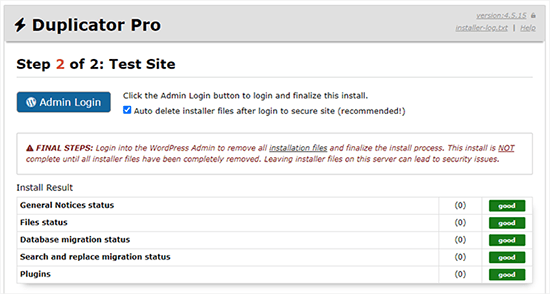
Duplicator kommer automatiskt att uppdatera URL:er till ditt nya domännamn. Du kan nu klicka på knappen 'Admin Login' för att slutföra nästa steg.
Steg 4: Ställ in permanenta 301-omdirigeringar
Nästa steg är att dirigera användare som anländer till ditt gamla domännamn till det nya domännamnet. Detta görs genom att ställa in 301-omdirigeringar.
301-omdirigeringar är mycket viktiga för SEO och användarupplevelse. Att lägga till dem gör att du automatiskt kan omdirigera användare och sökmotorer till ditt nya domännamn.
Med andra ord, när någon landar på ett inlägg eller en sida på din gamla domän, kommer de automatiskt att omdirigeras till samma inlägg eller sida på din nya domän istället för att se ett 404-fel.
För att behålla dina omdirigeringar måste du behålla din gamla WordPress-installation aktiv så att den kan fortsätta att omdirigera till den nya du just skapade.
Det finns två sätt att ställa in omdirigeringarna. Den första metoden är enkel och tar bara några klick. Den andra metoden kräver att du redigerar filer manuellt.
Metod 1: Konfigurera 301-omdirigeringar med All in One SEO
För den här metoden behöver du All in One SEO (AIOSEO). Det är det bästa WordPress SEO-pluginet på marknaden och låter dig enkelt optimera din WordPress-webbplats för SEO.
Först måste du installera och aktivera All in One SEO-pluginet på din gamla domän. För mer information, se vår steg-för-steg-guide om hur man installerar ett WordPress-plugin.
Notera: Du behöver minst Pro-versionen av pluginet för att komma åt tillägget för omdirigeringshantering. Du kan också konfigurera AIOSEO på din nya WordPress-webbplats för att öka din sökmotorranking och trafik ännu mer.
Efter aktivering på din gamla domän måste du besöka sidan All in One SEO » Omdirigeringar och klicka på knappen 'Aktivera omdirigeringar'.
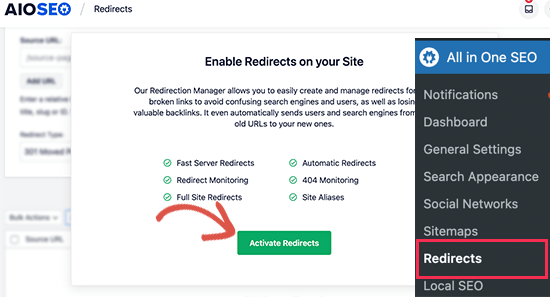
Gå sedan till fliken ‘Full Site Redirect’ och slå på reglaget ‘Relocate Site’.
Därefter behöver du ange ditt nya domännamn bredvid alternativet 'Flytta till domän'.
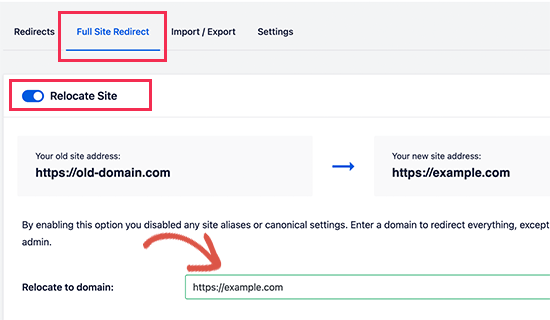
Glöm inte att klicka på knappen ‘Spara ändringar’ för att spara dina inställningar.
Metod 2: Ställ in omdirigeringar till ny domän manuellt
Den här metoden kräver att du redigerar WordPress .htaccess-filen på ditt gamla domännamn.
Först måste du ansluta till din gamla webbplats med FTP och redigera filen .htaccess.
Detta kommer att finnas i samma katalog som din wp-includes- eller wp-admin-mapp. Öppna .htaccess-filen och klistra in följande kodrader högst upp:
#Options +FollowSymLinks
RewriteEngine on
Unchanged: RewriteRule ^(.*)$ http://www.newsite.com/$1 [R=301,L]
Se till att du ersätter newsite.com med din nya domän i koden ovan.
När du har gjort dessa ändringar, besök sedan ditt gamla domännamn. Det bör automatiskt omdirigera dig till den nya domänen.
Om det inte gör det, betyder det att omdirigeringen inte är korrekt inställd, och din server stöder troligen inte omdirigeringsregler. Du måste kontakta supportteamet hos ditt webbhotell för att få RewriteEngine aktiverat.
Steg 5: Meddela Google om din nya domän
Nu när du har flyttat WordPress till ett nytt domännamn och konfigurerat omdirigeringar är det dags att meddela Google om din adressändring. Detta hjälper Google att snabbt hitta din nya webbplatsdomän och börja visa den i sökresultaten.
Först måste du se till att både din nya och gamla domän är tillagda i Google Search Console som två olika egenskaper. Se steg 1 i vår Google Search Console-guide för instruktioner.
Därefter måste du välja det gamla domännamnet som den aktiva egenskapen i instrumentpanelen för ditt Google Search Console-konto.
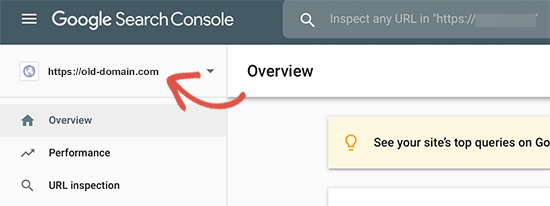
Klicka sedan på menyn Inställningar från den vänstra kolumnen.
Nu kan du klicka på verktyget 'Ändring av adress'.
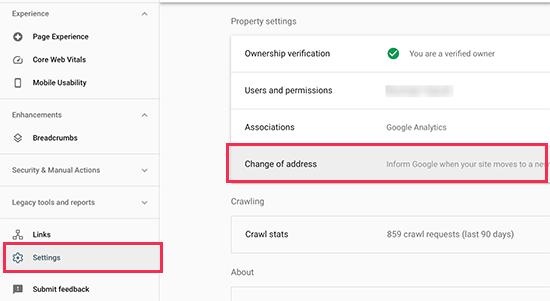
Nu behöver du välja din nya domän från avsnittet Uppdatera Google.
Klicka sedan på knappen 'Validera & Uppdatera'.
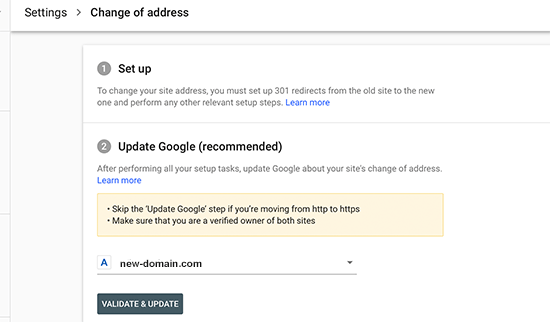
Det var allt. Google kommer nu att validera att din gamla domän omdirigerar till den nya domänen och spara dina ändringar.
På nästa skärm visar Google Search Console dig en steg-för-steg-guide för att skicka in din begäran om adressändring.
Meddela dina användare om det nya domännamnet
Även om 301-omdirigeringarna gör sitt jobb, är det alltid bra att göra ett offentligt tillkännagivande om migreringen.
Du kan göra detta genom att helt enkelt skriva ett blogginlägg på din nya webbplats och dela det på dina sociala mediekonton.
Om du har ett e-postnyhetsbrev eller prenumeranter på push-meddelanden, bör du skicka ett meddelande till dem också.
Detta kan vara användbart på många sätt.
Framför allt är det mer troligt att dina användare kommer ihåg den nya domänen när de läser om den.
För det andra kan du be dina användare att meddela dig om de ser några buggar. Du ensam kan inte testa din webbplats i alla typer av webbläsare eller systemmiljöer, så det är alltid bra att ha ett par nya ögon som tittar på den.
Vanliga frågor om att flytta en WordPress-webbplats
Vi förstår att du kanske fortfarande har några frågor om att migrera din WordPress-webbplats till en ny domän. Här är svar på några av de vanligaste vi får för att ge dig fullständigt förtroende för processen.
1. Kommer ändring av mitt domännamn att skada min SEO permanent?
Nej, det kommer inte att skada din SEO permanent om du följer rätt steg. Även om en tillfällig nedgång i rankning och trafik är normal när sökmotorer bearbetar ändringen, är den här guiden utformad för att minimera den påverkan.
Genom att korrekt ställa in 301-omdirigeringar (steg 4) och meddela Google via Search Console (steg 5) talar du om exakt var du har flyttat, vilket gör att de kan överföra din befintliga auktoritet till den nya domänen.
2. Behöver jag behålla min gamla domän efter att ha flyttat till den nya?
Ja, du måste absolut behålla ditt gamla domännamn aktivt under överskådlig framtid. Din gamla domän är vad som är värd för de permanenta 301-omdirigeringarna som guidar både användare och sökmotorer till din nya webbplats. Att låta den löpa ut skulle bryta alla dessa länkar, vilket leder till förlorad trafik och en betydande minskning av dina SEO-rankningar.
3. Hur lång tid tar hela domänmigreringsprocessen?
De tekniska stegen i den här guiden, från säkerhetskopiering av din webbplats till installation av omdirigeringar, kan vanligtvis slutföras på några timmar. Det kommer dock att ta längre tid för sökmotorer som Google att fullständigt genomsöka och indexera din nya domän. Även om det att meddela Google påskyndar detta, kan det ta flera veckor innan dina rankingar stabiliseras helt efter flytten.
4. Kan jag flytta min WordPress-webbplats utan att använda ett plugin som Duplicator?
Även om det tekniskt sett är möjligt att flytta en webbplats manuellt genom att överföra filer via FTP och exportera/importera databasen, avråder vi starkt från det för de flesta användare.
En manuell migrering är komplex och har en mycket högre risk för fel, som missade URL-uppdateringar eller problem med databanslutningen. Ett plugin som Duplicator automatiserar dessa kritiska steg, vilket gör processen säkrare, snabbare och mer pålitlig.
5. Vad är den huvudsakliga skillnaden mellan att flytta till en ny domän kontra en ny värd?
Tänk på det så här: att flytta till en ny domän är som att ändra din företags gatuadress. Att flytta till en ny värd är som att ändra företaget som äger byggnaden, men din adress förblir densamma. Den här guiden är specifikt för att ändra din adress (domän), vilket har unika SEO-krav, som 301-omdirigeringar, som är avgörande för framgång.
Videohandledning
Bonusresurser
Följande artiklar och handledningar hjälper dig att spåra och återfå dina SEO-rankningar efter att ha migrerat till ett nytt domännamn:
- Den ultimata checklistan för WordPress SEO-migrering (för nybörjare)
- Hur du kontrollerar om dina WordPress-blogginlägg rankas för rätt sökord
- Hur man spårar webbplatsbesökare till din WordPress-webbplats
- Tips för att optimera dina blogginlägg för SEO som ett proffs (Checklista)
Vi hoppas att den här handledningen hjälpte dig att flytta din WordPress-webbplats till ett nytt domännamn. Du kanske också vill se vår guide om hur du får en gratis e-postdomän eller följa stegen i vår kompletta WordPress SEO-guide.
Om du gillade den här artikeln, prenumerera då på vår YouTube-kanal för WordPress-videoguider. Du kan också hitta oss på Twitter och Facebook.





WPBeginner Staff
Vi är inte säkra på detta alternativ, vi har inte provat det själva så vi kan inte rekommendera det. Alla omdirigeringar du ställer in måste vara 301 så att sökmotorer kan uppdatera den nya platsen.
vikramforever
Jag har min domän hos GoDaddy och de har omdirigeringsalternativ med matchande sökväg som nämns på deras hjälpsida – http://support.godaddy.com/help/article/5120/redirect-urls-with-your-hosting-account.
Är detta ett genomförbart alternativ när jag överför min aktiva webbplats till en annan domän? Enligt alternativet i inlägget måste jag behålla värdtjänsten för min gamla domän tills den tidpunkt då jag vill att omdirigeringarna ska fungera. Att använda omdirigering med alternativet 'match path' skulle eliminera behovet av detta. Men jag vill vara säker på att detta är ett alternativ som fungerar på samma sätt som skriptet (som du nämnde) fungerar.
Keely Worth
Utmärkt – gör processen att flytta en WordPress-webbplats till en barnlek. Tack.
Ayman
I’ve just migrate a website site from one URL to another. I would really like to thank you for this great post. 100% working and a very simple instructions
Anas Khan
Trevligt inlägg. Jag har också några frågor,
Jag har 2 bloggar på WordPress. Den nya bloggen är aktiv och jag har 45 inlägg i min nya blogg. Den gamla bloggen har 192 inlägg och alla inlägg är indexerade på Google.
Nu vill jag överföra och publicera alla gamla 192 inlägg till min nya blogg så att alla inlägg kan ses på min nya blogg. Om jag tar bort alla inlägg från min gamla blogg, tar bort sitemap och webmasterverktyget för den gamla bloggen och efter 30 dagar publicerar jag gamla inlägg till den nya bloggen med knappen Lägg till nytt inlägg, fungerar det då? Räknas det som dubblettinnehåll?
WPBeginner Support
Du kan helt enkelt importera dessa inlägg till din nya blogg och ställa in en 301-omdirigering på dina gamla inlägg, inlägg för inlägg.
Admin
Mohammed Saimon
Ja, det är ett bra inlägg. Tack till författaren.
Vinish Garg
Det här är ett utmärkt inlägg och gav mig ny riktning för att flytta min WP-blogg från en domän till en annan. Jag skulle uppskatta om du kan rätta mig om jag har fel i planeringen enligt nedan.
– Jag känner till Hostgator och jag förstår hur man använder File Manager och sätter upp WP, databas och importerar/exporterar databas (xml-filer)
– Min nuvarande WP-blogg finns på: http;//www.example.com, och jag vill flytta den till en annan domän http://www.example.org.
– Först kommer jag att sätta upp en ny WP på den nya domänens rot (databas, konfigurationsfil, anpassat tema och importera datafil från gamla webbplatsen)
– Den nya webbplatsen kommer att visa webbplatsen exakt som den gamla, MEN den enda skillnaden är URL:en (på grund av den nya domänen).
Om allt är korrekt hittills... Jag är inte säker på hur jag ska använda omdirigeringar för alla mina gamla domäns sidor/inlägg till den nya domänen. Kan du vänligen ge råd?
WPBeginner Support
Du kan göra det genom att följa steg 3 i den här guiden, genom att konfigurera 301-omdirigeringar.
Admin
Stefan
Bra inlägg, tyvärr läste jag det för sent och har redan flyttat min domän. Allt jag har gjort är att jag har köpt en ny domän för min blogg (, innan var den fortfarande aktiv i ytterligare 2 månader). Jag har ändrat Wordpress URL och Webbplatsadress i Wordpress allmänna inställningar och skickat in sitemap igen med den nya URL:en. Det är allt jag har gjort.
Detta var en månad sedan och sedan dess har trafiken nu helt gått ner, från mer än 1 000 sidvisningar om dagen till nu inte ens 200.
Om jag googlar "thailand redcat" dyker inte ens en av mina sidor upp. Sitemappen har dock skickats in framgångsrikt:
14:51:35Stefan
Vet du vad som kan vara anledningen till detta och hur kan jag lösa problemet och få sökresultaten och så småningom trafiken tillbaka till det normala igen?
All hjälp skulle uppskattas enormt. Skål!
WPBeginner Support
Stefan, vi är inte säkra på att vi förstår processen du följde för att flytta din webbplats till en ny domän. Här är några allmänna tips. Se först till att sökmotorrobotar kan genomsöka och indexera din webbplats? Kontrollera din webbplats i Google webmasterverktyg för genomsökningsfel.
Admin
Charlie
Jag har samma problem. Google-crawlers hittar ett 500-fel på hela webbplatsen sedan migreringen. Jag har provat på 2 olika miljöer/leverantörer, olika php-versioner, jag har försökt att avaktivera/återaktivera alla mina plugins en efter en, jag har försökt att generera om permalinks, htaccess, robots.txt… inget fungerar.
Mr Joy
Tack för ditt utmärkta inlägg. Jag följde ditt inlägg och flyttade min webbplats till en ny domän. Allt fungerar bra men det finns bara ett problem på min webbplats angående WordPress visuella redigerare. Problemet är "När jag laddar upp en bild på ett inlägg via alternativet Lägg till media, klickar jag sedan på bildminiatyren "redigera bild" en iFrame kommer med ett felmeddelande om att sidan inte hittades. Men när jag klickar på ta bort fungerar det bra. Vänligen hjälp mig att lösa problemet. Kontrollera skärmdumpen: http://bit.ly/1fqjE1b
WPBeginner Support
Det första du kan prova är att uppdatera dina permalänkar, gå helt enkelt till Inställningar » Permalänkar och klicka på knappen Spara ändringar.
Admin
AP
Utmärkt arbete – tack så mycket! Det kan vara bra att lägga till svaret ovan – det som handlar om skapande och användning av nya databaser – i de inledande instruktionerna, eftersom inte alla kommer att läsa kommentarerna innan de försöker göra en överföring.
Gary Kirwan
Bra artikel. Min fråga är att jag använder metoden för affiliate-döljning som rekommenderas av Yoast, vilket innebär att jag har en .htaccess-fil under en mapp som heter /out/
Skulle jag behöva lägga till samma 301-omdirigeringskod som nämns i artikeln till båda .htaccess-filerna i rotkatalogen och underkatalogen för affiliate-länkar? Täcker det att lägga till 301-omdirigeringskoden i .htaccess-filen i rotkatalogen automatiskt den i undermapparna?
Målet är att säkerställa att externa affiliate-länkar fungerar korrekt också.
Kingsley
Bra handledning, kommer att använda den för att migrera http://www.ideacrunch.org till http://technblogging.com under de närmaste dagarna men jag har en fråga. Kommer databaslösenordet och användarnamnet att vara detsamma som på den gamla webbplatsen?
Craig
Hej, jag uppskattar att detta är lite sent. Men jag vill bokstavligen bara flytta från http://www.unlockworldtv.co.uk till http://www.unlockworldtv.com är den här handledningen lämplig för det? Jag flyttar inte värdar, bara ändrar URL:en
WPBeginner Support
Ja, det är det.
Admin
Craig
Tack. Jag sitter fast vid att gå till newsite.com/installer.php, jag får bara min gamla webbplats men med 404. Jag installerade inte wp i den nya katalogen, skapade bara en tom katalog för att lägga installationsprogrammet och zip-filen i. Jag pekar min nya domän från registrar-kontot till den nya katalogen hos min webbhotell men får inget annat än temat och 404. Några uppenbara tips?
Craig
Bara för information, jag löste detta. Det verkar vara ett problem med 1&1 (ingen överraskning) men kan lösas genom att ha en index.html-fil närvarande. Så för alla på 1&1, justera steg 2 från
"Se till att rotkatalogen, eller katalogen där du vill kopiera din webbplats, är helt tom." till "Se till att rotkatalogen, eller katalogen där du vill kopiera din webbplats, är helt tom förutom installer.php, .zip-filen OCH en index.html-sida"
Jag tror att detta har att göra med hur 1&1 prioriterar sidor på sin server.
Denis Fitzgerald
Hej – Tack för artikeln. Jag har en fråga: Jag byter min webbplats från Tumblr till Wordpress. Den har sin egen domän. Jag skulle vilja veta om knapparna i slutet av varje artikel som visar sociala delningar, Twitter, Facebook, Google+, kommer att behålla det ursprungliga delningsantalet eller gå tillbaka till noll. Tack.
WPBeginner Support
Om det är samma domän och din URL-struktur förblir intakt, då kommer du förhoppningsvis att kunna behålla dessa sociala räkningar.
Admin
Bertjan
Utmärkt guide! Tack så mycket.
Sudha Mathew
Hej, jag flyttade min webbplats med omdirigeringar för cirka 6 månader sedan och det fungerar bra. Jag behöver förnya mitt kontrakt med webbsäkerhetsföretaget snart. Så jag behöver veta hur mycket trafik som fortfarande omdirigeras från den gamla webbplatsen. Kan du förklara hur man gör det? Jag är inte tekniskt kunnig men kan använda både Webmasterverktyg och Google Analytics. Tack på förhand!
Bäst
Sudha
Moti
Hej,
Jag skulle vilja ändra domännamnet på min webbplats (stanna kvar på samma värd).
I instruktionerna ovan anges att jag ska "se till att rotkatalogen, eller katalogen dit du vill kopiera din webbplats, är helt tom".
I mitt fall är WP installerat i rotkatalogen (jag har mappen wp-content under public-html) – jag antar att detta betyder att min WP är installerad under rotkatalogen.
Vilka mappar ska jag rensa / ta bort innan jag kör den installerade filen som genereras av duplicatorn?
Tack,
Moti.
Declan
Tack för handledningen. Fungerade utmärkt utan några problem alls.
Jag har naturligtvis en fråga angående SEO.
Min gamla webbplats var inte registrerad i Googles webbansvarigverktyg, så uppenbarligen finns det inget alternativ att meddela dem om de ändringar jag har gjort. Min fråga är: Måste jag först registrera min gamla domän hos Googles webbansvarigverktyg, och sedan min andra domän... och sedan meddela dem om ändringarna?
Alla tankar vore bra.
Tack igen för artikeln, den var extremt hjälpsam.
Declan.
WPBeginner Support
Ja, du måste meddela ändringen på din gamla webbplats webbansvarigverktygskonto. Detta är dock bara det snabbaste sättet att göra det. Om du har ställt in dina 302-omdirigeringar skulle sökmotorerna plocka upp det också.
Admin
reza
hej,
detta fungerar utmärkt, jag omdirigerar min gamla.com som är min huvuddomeän till nya.com som är en tilläggsdomeän (på samma hosting)
men när jag lade till en ny tilläggsdomän kunde min nya tilläggsdomän inte nås... den omdirigerar alltid min addon.com till new.com/addon.com...
kan du hjälpa till ??
Jennifer @ Delicieux
Tack för att du förklarade detta i så mycket detalj. Jag har dock en fråga. Jag har funderat på att flytta till ett nytt domännamn ett tag, men jag ville veta om jag skulle ha några problem med tanke på att jag tidigare under året ändrade permalänkstrukturen på min gamla blogg.
Jag följde instruktionerna på Yoast om hur man ändrar min permalänkstruktur och redigerade min .htaccess-fil, och undrar om detta kommer att orsaka problem när jag flyttar till en ny domän? Detta är det enda som håller mig tillbaka eftersom jag inte vill att saker ska gå fel och förlora rankning och sluta med trasiga länkar.
WPBeginner Support
du kan överföra din gamla .htaccess-fil till din nya webbplats. Om .htaccess-filen har några referenser till det gamla domännamnet, ersätt dem med det nya domännamnet så blir det bra.
Admin
Hrayr
Hej,
Först och främst, tack så mycket för den här artikeln – den fungerade utmärkt utan några problem för mig!
Jag har en enkel fråga specifik för mitt fall, skulle verkligen uppskatta dina tankar om detta.
I grund och botten använde jag detta tillvägagångssätt för att kopiera min WordPress-webbplats från localhost till värden/domänen från en tredjepart.
Som sagt fungerade allt bra – jag vill bara försäkra mig om att detta tillvägagångssätt inte lämnar några gamla URL:er/länkar/referenser som kan "störa" Google att krypa denna nya webbplats. Min webbplats är ganska enkel, så i värsta fall kan jag bara återskapa den om det finns några nackdelar med krypning/SEO när webbplatsen kopieras av duplicator.
Finns det några kända SEO-problem med den nya webbplatsen som du känner till?
WPBeginner Support
Vi känner inte till några SEO-problem, men om du stöter på några kan du informera plugin-utvecklaren genom att öppna en supporttråd på pluginets sida.
Admin
Kevin
Jag tror inte att metoden du föreslår för 301-omdirigering är den bästa. Det är väldokumenterat, till och med rekommenderat av Google, att man gör sid-till-sid-omdirigeringar, INTE dumpa alla gamla webbplatsens sidor till startsidan på den nya webbplatsen. htaccess-koden du tillhandahåller gör det senare. Det är inte ett bra sätt att bevara länkjuice.
Kanske kan du hänvisa oss till en bra handledning för htaccess istället? Det finns också online-generatorer för htaccess som kan göra det mycket snabbare att göra sid-till-sid-omdirigeringar.
WPBeginner Support
Kevin, du har rätt och omskrivningsreglerna i artikeln gör precis det. Istället för att omdirigera användare till startsidan skickar de dem till den enskilda sidan. $1 i slutet av koden lägger till länken med rätt permalänkstruktur.
Admin
Julian
Hej, när jag gör detta efter 'deploy' missar det 'update'-sektionen och återgår till en 404-sida på den gamla webbadressen... någon idé om vad som kan orsaka detta?
Tack så mycket!
Munna
Thank you very much for this post. I was in trouble redirecting my oldsite visitors to the new site. But your .htaccess code made it super easy because both sites were in the same hosting server.
Raspal
Hej,
Jag har slutfört alla steg och bloggen på den nya webbplatsen fungerar bra. Men jag kan inte logga in i administratörsområdet. Jag har två användare, en är administratör. Jag får det här felet när jag försöker logga in:
“FEL: Cookies är blockerade eller stöds inte av din webbläsare. Du måste aktivera cookies för att använda WordPress.”
Jag provade olika webbläsare och försökte även rensa cookies. Försökte också ändra lösenord. Lösenordet ändrades bra men jag får fortfarande ovanstående fel.
Kan du hjälpa mig snarast?
Använder WP version 3.7.1
Med vänliga hälsningar,
Raspal
Neil Bargas
Tack mannen! 100% fungerande och mycket enkla instruktioner.
Lynn
Fantastic article! You are my hero of the day.
Jahid
”Logga in på din nya webbplats WordPress-admin med samma användarnamn och lösenord som du hade på den gamla webbplatsen. Gå till Inställningar » Permalänkar i din nya webbplats WordPress-admin och klicka på spara-knappen.”
När jag loggar in visas sidan för första steget ”Steg 1: Filer & Databas” istället för WordPress-instrumentpanelen. Hjälp!
WPBeginner Support
Det verkar som att du behöver uppdatera din wp-config.php-fil
Admin
Chrissy
Hej! Tack så mycket för den här hjälpsamma artikeln – jag håller på att gå igenom stegen nu.
Min enda fråga är:
Jag har min blogg hostad på en domän, låt oss kalla den http://www.reallylongdomainname.com/blog, men jag har en omdirigering för att skicka den till min andra domän: blog.shortername.com. Jag vill nu migrera bloggen till shortername.com/blog, eftersom vissa av länkarna inte fungerar efter omdirigeringen.
Alla mina inlägg och saker har redan permanenta länkar på shortname.com/blog/post#, så behöver jag verkligen göra något av detta 301-trams? Är jag säker på att hoppa över steg 3, 4 & 5, eller finns det något jag behöver tänka på? Och kommer jag att behöva ta bort den gamla bloggen eller bara omdirigeringen när jag lanserar den på den nya domänen?
Det vore verkligen bra att få veta hur jag ska gå vidare, eftersom jag har provat dussintals saker den här veckan och ingen situation är riktigt densamma som min :/ Tack!
WPBeginner Support
Syftet med 301-omdirigeringar är inte bara att omdirigera användare utan också att låta sökmotorer veta att du har flyttat till den nya platsen, så steg 3 och 4 är ett måste, annars kan det påverka dina SEO-rankningar.
Admin
Mark P
Bra inlägg. En fråga dock.
Låt oss säga att någon klickar på en bakåtlänk till min webbplats gamla domän. (Låt oss kalla den olddomain punkt com / bloggpost1). Kommer detta då att omdirigeras till den nya domänens respektive länk (newdomain punkt com / bloggpost1) istället för att bara omdirigeras till den nya domänens startsida?
WPBeginner Support
Ja, det skulle omdirigera användare som landar på dina inlägg och sidor på den gamla webbplatsen till inläggen/sidorna på den nya webbplatsen.
Admin
Mark P
Tack!
Morgan
Fråga: Jag byter min webbplats från en värd till en ny värd. Samtidigt ändrar jag mitt domännamn. Jag har redan framgångsrikt överfört min WordPress-webbplats till min nya värd med det nya domännamnet. Jag är nu vid steg 3 och vill använda 301-omdirigeringar för att peka de gamla URL:erna till de nya webbplats-URL:erna. Dock är den gamla webbplatsen på den gamla värden och jag planerar att göra mig av med den webbplatsen.
Kommer 301-omdirigeringarna fortfarande att fungera? Eller behöver jag också flytta den gamla webbplatsen till min nya värd och SEDAN göra omdirigeringarna? Jag är lite osäker på vad jag ska göra och skulle uppskatta alla råd.
WPBeginner Support
Om det är möjligt för dig att hålla den gamla webbplatsen online i minst en månad, kan du lägga till 301-omdirigering. Efter det, uppdatera din webbplats information i Google Webmaster-verktyg. När du har återhämtat dina sökrankningar och trafik kan du sedan stänga ditt konto hos den gamla webbhotell.
Admin
Nj
Thank you for the helpful posts, but sometimes with such plugins, a video will help A LOT. I hope you will consider this
Thanks again
Arnold
Hej. Kan du snälla förklara delen där du sa "Installatören kommer att be dig att ange databasinformation för den nya webbplatsen och markera rutan för Tabortabell?" Var hittar jag denna databasinformation? Så ska jag markera rutan för Tabortabell? Tack!
WPBeginner Support
Detta är databasen där du kommer att importera din gamla webbplats från paketet du skapade tidigare. Logga in på din webbhotellsinstrumentpanel, hitta phpmyadmin och skapa en ny databas. Gå tillbaka till installer.php och ange det nya databasnamnet, värden, användare och lösenord.
Admin
Kara Lumsden
Så du bör inte installera wordpress i roten av den nya domänen? Det enda du behöver göra på den nya domänen är bara att skapa en ny databas, är det korrekt? Kan du utveckla lite mer om hur man skapar databasen i phpmyadmin?
Så tacksam, tack för allt du gör!
WPBeginner Support
Nej, det går bra att installera WordPress i roten på den nya domänen. Ja, du behöver bara skapa en ny databas och Duplicator sköter resten.
Kara Lumsden
Kan du vänligen ge instruktioner om hur man skapar databasen?
Tack så mycket,
Kara
Dennis J. Smith
Hur länge bör man vänta innan man tar bort den gamla webbplatsen?
WPBeginner Support
30 till 90 dagar, beror på hur framgångsrik din flytt var. Om du är säker på att din nya domän har fått nästan samma trafik som den gamla webbplatsen, kan du ta bort den.
Admin
dyer
Hej, jag har stött på ett problem. Jag kan inte spara mina permalänkar eftersom jag inte kan hitta WP admin-filen. Jag har försökt ladda upp WP admin-filen igen men det har inte löst problemet. Kan du snälla ge mig råd om det finns några andra steg jag kan ta för att åtgärda detta problem.
Tack
Dyer
WPBeginner Support
@dyer Vi kan inte förstå din fråga. Vi antar att du inte kan komma åt ditt WordPress Admin-område. I så fall, anslut till din webbplats med en FTP-klient som filezilla. Hitta filen
.htaccessladda ner den till din hårddisk och ta bort den från din webbplats. Hoppas detta löser ditt problem.Admin
Fakhre
Tack för artikeln grabbar!
Jag har min webbplats hos Bluehost och vill bara ändra domännamnet utan att tappa SEO och backlinks.
Mitt webbplatsinnehåll är enormt, jag har cirka 8000 inlägg. Någon lösning för att byta namn på domeän??
Sanjay Patel
Hej…
Verkligt användbar information men duplicator-pluginet fungerar inte på min webbplats. Vänligen lös mitt problem. Hur gör jag detta?
Tack på förhand.
Dinah
Fungerar detta med att flytta från en domän till en underdomän?
Redaktionell personal
Ja
Admin
Dinah
Fungerar detta för att flytta till en ny underdomän? Som om min wordpress-blogg var på oldsite.com och jag ville ha den på blogg.newsite.com, skulle jag göra samma sak?
Redaktionell personal
Ja.
Admin
Emmie
Jag gjorde nyligen detta och länkarna och allt omdirigerades fint och prydligt, men jag blev nyss slagen av Google med en påföljd för att omedelbart ha så många backlinks – de tror att jag köpte dem. Har någon annan stött på detta? Jag gjorde de lämpliga anmälningarna i Google Webmaster Tools innan jag flyttade, och det har inte hjälpt. Det har slagit mig hårt, så om någon har erfarenhet av att åtgärda detta, dela gärna med er!
Redaktionell personal
Hej Emmie, var ser du att du får stryk för att ha för många backlinks? Visar den dig det felet i dina Webmasterverktyg? Försöker bara se hur du kom fram till slutsatsen att du blivit straffad av Google.
https://www.google.com/webmasters/tools/reconsideration << Det här är sidan där du kan skicka en begäran om omprövning till Google.
Admin
Lateef Adewale
Har du någon aning om detta kommer att fungera om jag flyttar en webbplats från Bluehost till Wp Engine.
Redaktionell personal
Ja, det borde fungera.
Admin
Emily
Gick precis igenom hela den här processen, fungerade perfekt och precis vad jag behövde veta. Tack WPBeginner! Det enda problemet jag stötte på var mitt eget fel – jag deaktiverade inte mina säkerhetsplugins först så jag fick göra om allt. Nu är jag expert… : )
Sandra Christie
Tack för artikeln!
Är stegen för att flytta samma domän till en ny värd i princip desamma? Och kan det också orsaka en nedgång i SEO?
Travis Pflanz
Dessutom finns alternativet "Adressändring" i Webmaster Tools nu i menyalternativet högst upp till höger i kugghjulsikonen.
Zach Smith
Tack för att du publicerade ytterligare en bra artikel för oss. Detta är bäst för alla teknikrelaterade bloggar.
Bob
Tack – det här är bra information. Jag är verkligen exalterad över att lära mig om Duplicator. Medan att flytta en domän är något jag kan behöva göra ibland, klonar jag ständigt miljöer för utvecklings- och teständamål. Den manuella kloningsprocessen jag har använt är tidskrävande och potentiellt felbenägen. Duplicator har potential att vara en betydande förbättring!
Sam
Jag flyttade precis WP till en ny domän och server med den här metoden. Webmaster Tools visar nu många 403-fel på den nya servern för varje mapp i uppladdningar, som wp-content/uploads/2012/07 och ett 403-fel för varje månad. På min gamla server fick jag inte detta. När vi flyttar webbplatsen, bör vi också ändra eller kontrollera behörigheterna? Vad bör de vara för mappen wp-content/uploads?
Redaktionell personal
Google bör inte indexera mapparna utan de bör indexera filerna inuti dem. Om du försöker komma åt mappen direkt via en webbläsare kommer WordPress att ge dig ett 404-fel. Du vill inte tillåta åtkomst till en katalog som inte har någon indexsida, vilket sedan kommer att producera en kataloglistning som indexeras och genomsöks, inklusive länkarna till alla filer.
Admin
sam
Tack för svaret. Varför visar då Google ett 403-fel för mapparna i webmasterverktyg? Betyder inte det att något är fel?
Zimbrul
DET HÄR ÄR ARTIKELN JAG LETAT EFTER I 1 ÅR NU!!
Redaktionell personal
Better late than never
Admin
Jasim Ahmed
Duplicator är ett utmärkt plugin men problemet är att det inte fungerar med vissa servrar eftersom det kräver en högre PHP-version, finns det något annat sätt att göra det?
Redaktionell personal
Ja, du kan manuellt ladda ner filerna och databasen. Ladda upp dem på den nya domänen. Ersätt alla gamla URL-instanser i databasen med hjälp av phpMyAdmin SQL sök- och ersätt-fråga. Den enklare lösningen skulle vara att fråga din värd varför de inte har högre versioner av PHP eller byta till en bättre värd.
Admin
iAn
hej, jag tror inte att detta kommer att bevara dina sociala nätverks delningsräknare (antal delningar och gillamarkeringar). Någon idé om hur man behåller dessa popularitetsmätare?
Redaktionell personal
Du kan inte behålla de sociala räknarna eftersom de baseras på dina kanoniska URL:er, som kommer att vara den nya webbplatsen (mycket viktigt för SEO). Räknarna är främst för sociala bevis. Alla befintliga länkar i sociala medier kommer att omdirigeras korrekt, så du kommer inte att förlora någon trafik där.
Admin